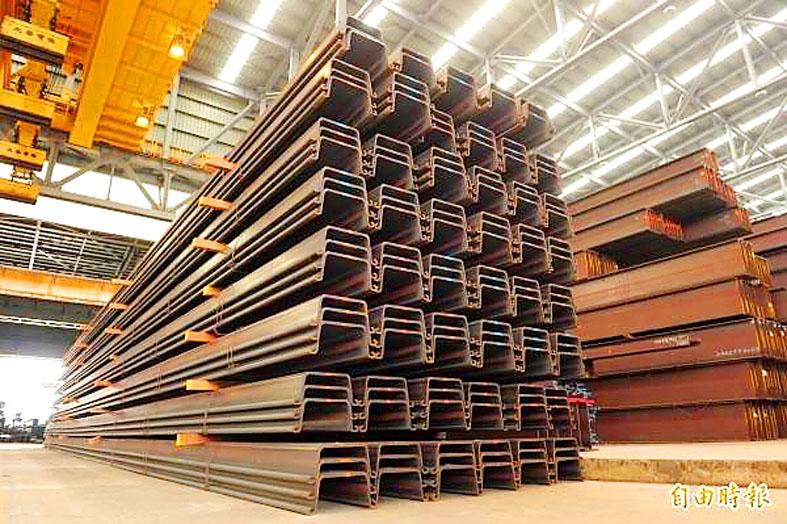China Steel Corp (CSC, 中鋼), the nation’s biggest steelmaker, yesterday said that it would raise prices by 1.7 percent for next month's deliveries to reflect rising raw material costs.
The Kaohsiung-based firm said it would also increase prices for next quarter's deliveries by 8.3 percent, as market demand remains strong and production cost continues to rise.
CSC updates prices for products such as hot-rolled steel on a monthly basis to reflect market conditions, it said.

Photo: Lin Ching-hua, Taipei Times
The company updates prices for other products, such as automotive steel, on a quarterly basis, it added.
“Our principle is to set prices that are steady, gentle, opportune and balanced,” the company said in a news release. “We have taken the competitiveness of the steel industry, the cost of raw materials and price pressure on steel companies into account.”
CSC said that it anticipates strong demand ahead.
“The signs of a global recovery in manufacturing are clear,” it said. “Demand for automobiles, infrastructure projects and home appliances is rapidly increasing.”
“The World Steel Association predicts an increase of 4 percent in global steel demand this year,” CSC said.
On the demand side, companies have been slow to restore capacity to what it was prior to the COVID-19 pandemic.
“On the supply side, due to the impact of COVID-19 and extreme weather, some blast furnaces in Asia and Europe have been slow to return to production,” CSC said. “Together with disruptions in logistics, we have seen major delays.”
Downstream Taiwanese steel inventory “has reached the lowest point in years,” it said.
CSC cited high costs of raw materials, such as iron ore, scrap steel and smelting materials, for its increase of average steel prices.
“The cost of iron ore reached US$178 per tonne at one point,” the company said. “This is not too far from the all-time high of US$194.”
“Globally, steel companies are continuing to absorb the pressure of high raw material costs,” it said. “Going into the traditional strong season of the second quarter, there is clearly space for steel products that are priced each quarter to become more expensive, especially in cases where prices have fallen far behind monthly-priced products.”
Monthly-priced hot-rolled steel and cold-rolled steel are to rise NT$450 per tonne each, while electromagnetic coils are to go up in a range from NT$600 to NT$1,200 per tonne, CSC said.
For quarterly priced products, steel boards are to rise NT$2,500 per tonne, hot-rolled high-carbon steel by NT$2,800 per tonne and automotive steel by NT$2,800 per tonne, it said.

The US dollar was trading at NT$29.7 at 10am today on the Taipei Foreign Exchange, as the New Taiwan dollar gained NT$1.364 from the previous close last week. The NT dollar continued to rise today, after surging 3.07 percent on Friday. After opening at NT$30.91, the NT dollar gained more than NT$1 in just 15 minutes, briefly passing the NT$30 mark. Before the US Department of the Treasury's semi-annual currency report came out, expectations that the NT dollar would keep rising were already building. The NT dollar on Friday closed at NT$31.064, up by NT$0.953 — a 3.07 percent single-day gain. Today,

‘SHORT TERM’: The local currency would likely remain strong in the near term, driven by anticipated US trade pressure, capital inflows and expectations of a US Fed rate cut The US dollar is expected to fall below NT$30 in the near term, as traders anticipate increased pressure from Washington for Taiwan to allow the New Taiwan dollar to appreciate, Cathay United Bank (國泰世華銀行) chief economist Lin Chi-chao (林啟超) said. Following a sharp drop in the greenback against the NT dollar on Friday, Lin told the Central News Agency that the local currency is likely to remain strong in the short term, driven in part by market psychology surrounding anticipated US policy pressure. On Friday, the US dollar fell NT$0.953, or 3.07 percent, closing at NT$31.064 — its lowest level since Jan.

Hong Kong authorities ramped up sales of the local dollar as the greenback’s slide threatened the foreign-exchange peg. The Hong Kong Monetary Authority (HKMA) sold a record HK$60.5 billion (US$7.8 billion) of the city’s currency, according to an alert sent on its Bloomberg page yesterday in Asia, after it tested the upper end of its trading band. That added to the HK$56.1 billion of sales versus the greenback since Friday. The rapid intervention signals efforts from the city’s authorities to limit the local currency’s moves within its HK$7.75 to HK$7.85 per US dollar trading band. Heavy sales of the local dollar by

The Financial Supervisory Commission (FSC) yesterday met with some of the nation’s largest insurance companies as a skyrocketing New Taiwan dollar piles pressure on their hundreds of billions of dollars in US bond investments. The commission has asked some life insurance firms, among the biggest Asian holders of US debt, to discuss how the rapidly strengthening NT dollar has impacted their operations, people familiar with the matter said. The meeting took place as the NT dollar jumped as much as 5 percent yesterday, its biggest intraday gain in more than three decades. The local currency surged as exporters rushed to